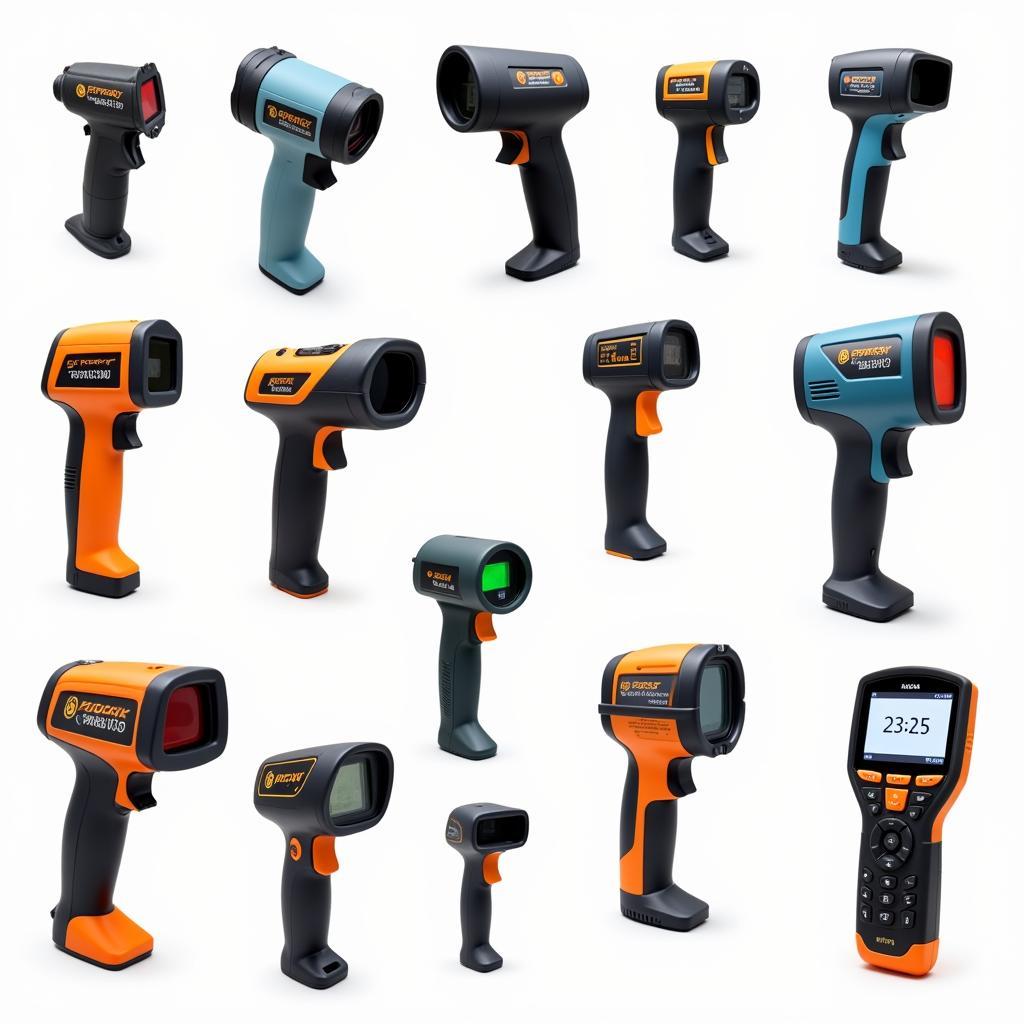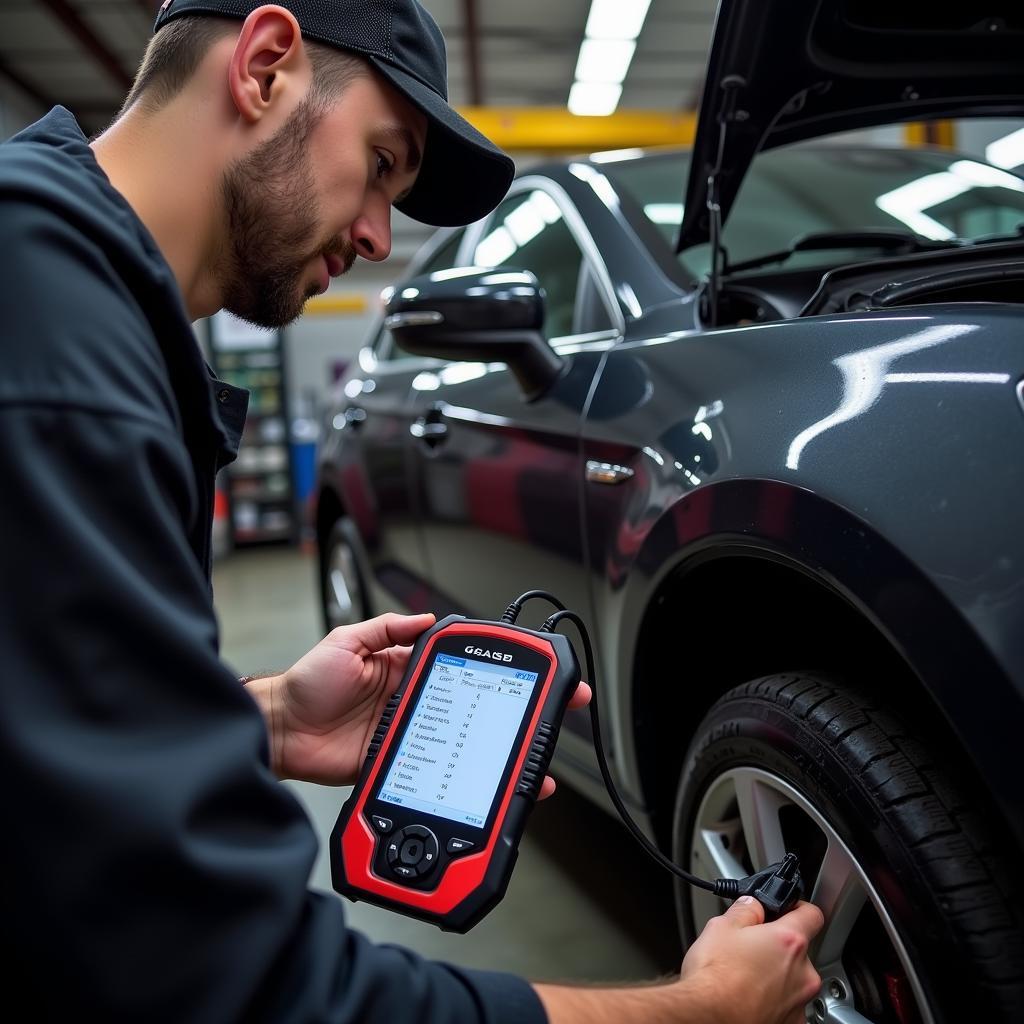A scan tool, also known as an OBD2 scanner or car diagnostic tool, is an essential device for any car owner, mechanic, or automotive enthusiast. It allows you to tap into your vehicle’s onboard computer system, retrieve diagnostic trouble codes (DTCs), and understand the story behind those cryptic warning lights on your dashboard.
Unraveling the Mystery: How Scan Tools Communicate with Your Car
Imagine your car speaking a language, and the scan tool acting as your translator. Modern vehicles have an onboard computer called an Engine Control Unit (ECU), constantly monitoring various systems like the engine, transmission, emissions, and more. When a problem arises, the ECU generates a DTC, storing it in its memory. This is where the scan tool comes in.
Connecting to the OBD2 port, typically located under the dashboard on the driver’s side, the scan tool acts as a bridge between you and the ECU. It retrieves the stored DTCs, displaying them in an understandable format.
Beyond Codes: Delving into the Capabilities of a Scan Tool
While retrieving DTCs is a primary function, scan tools offer much more than just code reading. Depending on the model and its features, you can:
- Read and clear DTCs: Identify and clear existing trouble codes.
- View live data stream: Monitor real-time sensor readings, such as engine RPM, coolant temperature, oxygen sensor voltage, and more. This data helps diagnose issues while the engine is running.
- Perform actuator tests: Command various components, like fuel injectors or solenoids, to test their functionality.
- Conduct system resets: Reset systems like the TPMS (Tire Pressure Monitoring System), oil life indicator, or electronic parking brake.
- Access advanced functions: Some advanced scan tools offer programming and coding capabilities, allowing for modifications or updates to the vehicle’s software.
Types of Scan Tools: Finding the Right Fit for Your Needs
Scan tools come in various shapes, sizes, and capabilities. Understanding the different types helps you choose one that aligns with your expertise and budget.
-
Basic Code Readers: As the name suggests, these offer basic functionality, mainly reading and clearing DTCs. They are affordable and suitable for car owners wanting to understand and address simple issues.
-
Mid-Range Scan Tools: These offer more features than basic code readers, including live data streaming, some actuator tests, and the ability to graph data. They cater to DIY enthusiasts and small workshops handling a wider range of diagnostics.
-
Professional-Grade Scan Tools: Packed with advanced features, these are the go-to choice for professional mechanics and dealerships. They offer comprehensive diagnostics, bi-directional control, coding capabilities, and access to manufacturer-specific information.
The Power of Information: Benefits of Using a Scan Tool
Investing in a scan tool, regardless of its complexity, empowers you with valuable information about your vehicle. Here’s how:
- Save Time and Money: Quickly identify the root cause of issues, avoiding unnecessary guesswork and costly repairs.
- Early Detection: Regularly scanning your car can help detect potential problems early on, preventing major breakdowns and expensive fixes.
- Enhanced Understanding: Gain deeper insights into your vehicle’s health, performance, and maintenance needs.
- DIY Empowerment: For the mechanically inclined, a scan tool enables self-diagnosis and repairs, saving on trips to the mechanic.
“A scan tool is like having x-ray vision for your car,” says John Smith, a seasoned automotive engineer with over 20 years of experience. “It lets you see beyond the surface and understand what’s really happening inside.”
Choosing the Right Scan Tool: Factors to Consider
With a plethora of options available, selecting the right scan tool can seem overwhelming. Consider these factors before making a decision:
-
Vehicle Compatibility: Ensure the scan tool supports your vehicle’s make, model, and year. Some are vehicle-specific, while others offer broader compatibility.
-
Features: Determine the features essential for your needs, considering the level of diagnostics you intend to perform.
 Different Types of Scan Tools
Different Types of Scan Tools
-
User Interface: Opt for a scan tool with a user-friendly interface, clear menus, and easy-to-understand data display.
-
Budget: Scan tool prices vary greatly depending on their features and capabilities. Set a budget that aligns with your needs and usage.
-
Updates and Support: Choose a reputable brand that provides regular software updates and reliable customer support.
Conclusion
A scan tool is an indispensable tool in today’s automotive world, providing a window into the electronic intricacies of your vehicle. Whether you’re a car owner seeking basic diagnostics or a professional mechanic needing advanced capabilities, understanding “what is a scan tool” and its diverse applications empowers you to make informed decisions about your vehicle’s maintenance and repair.
Need help finding the right scan tool for your needs? Contact ScanToolUS today at +1 (641) 206-8880 or visit our office at 1615 S Laramie Ave, Cicero, IL 60804, USA. Our team of experts can guide you towards the perfect solution.

